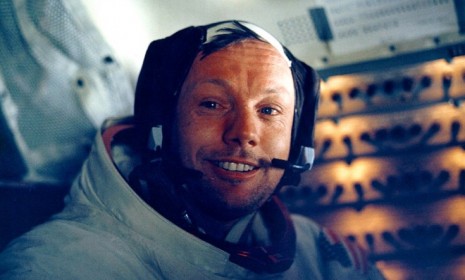Remembering Neil Armstrong: A humble hero and legendary astronaut
"That's one small step for [a] man, one giant leap for mankind," Armstrong said as he set foot on the moon and inspired generations of people around the world

A free daily email with the biggest news stories of the day – and the best features from TheWeek.com
You are now subscribed
Your newsletter sign-up was successful
Neil Armstrong, the first human being ever to set foot on the moon, died Saturday following complications from heart surgery. He was 82. The legendary astronaut, who captivated the world on July 20, 1969, when he stepped off the Eagle lunar module as some half a billion earthbound people watched the grainy image on TV, is perhaps best remembered for uttering one of the twentieth century's most enduring phrases: "That's one small step for [a] man, one giant leap for mankind." Received as a hero on his return to Earth, Armstrong preferred life away from the spotlight, leaving NASA shortly after the iconic Apollo 11 mission to become a professor of engineering at the University of Cincinnati. He represented the rarest kind of creature, says Ed Yong at Discover Magazine: "The humble hero." Here, writers and stargazers honor his memory:
Armstrong was brave and unflappable
"Astronauts do not like to be called heroes," says The Economist. "Their riposte to such accusations is to point out it requires the efforts of hundreds of thousands of backroom engineers, mathematicians, and technicians who make space flight possible." But such demurring never works, especially in the steely and unflappable Armstrong's case. Once, Armstrong ejected from a lunar training vessel just seconds before it smashed into the ground and exploded. According to witnesses, "Armstrong dusted himself off and coolly went back to his office for the rest of the day, presumably to finish up some paperwork."
The Week
Escape your echo chamber. Get the facts behind the news, plus analysis from multiple perspectives.

Sign up for The Week's Free Newsletters
From our morning news briefing to a weekly Good News Newsletter, get the best of The Week delivered directly to your inbox.
From our morning news briefing to a weekly Good News Newsletter, get the best of The Week delivered directly to your inbox.
He epitomized the best of his generation
Armstrong's was a "quiet bravery," says Adam Frank at NPR. He had a "calm just-get-it-done skill," and in many ways, he epitomized the optimism that many latched onto during the raucous, divisive '60s. In spite of the turmoil and dissent stemming from the Vietnam War, the Cold War, and the assassinations of Robert F. Kennedy and Martin Luther King Jr., an important idea simmered in America's collective consciousness: "Technology combined with our own audacity would allow us to do great things." And that's exactly what Armstrong captured: The idea that anything was possible.
Armstrong was humble to a fault
The legendary astronaut avoided the spotlight, says James M. Clash, author of The Right Stuff, at Bloomberg Businessweek. For years, Armstrong denied my requests for interviews, and it wasn't until years after I'd gained his trust and friendship that he finally agreed to be interviewed for my book — a gesture he knew would mean the world to me. "That's the kind of man Armstrong was. In a world where everything is about 'me, me, and me,' he was a rare throwback to a time when humility and character counted, when people routinely risked their lives not to get rich, bloviate, or self-aggrandize, but for their country, science, and exploration."
A free daily email with the biggest news stories of the day – and the best features from TheWeek.com
And his death may have been under-covered
For one magical week in 1969, Armstrong was the most visible man on television, says the Associated Press. But strangely, "television news didn't seem to fully recognize the importance of the first human to walk on the moon on the weekend he died." The relative lack of coverage is understandable in some ways: Late on an August Saturday, most networks have half their staffs at the beach. And because Armstrong was relatively shy, he didn't leave much of a video record. There were no "reunions with old astronauts or public appearances. No Armstrong chats with David Letterman." There was the moon walk, and that's it. "His death was like his life: Strangely muted given the magnitude of his achievements."
-
 How to Get to Heaven from Belfast: a ‘highly entertaining ride’
How to Get to Heaven from Belfast: a ‘highly entertaining ride’The Week Recommends Mystery-comedy from the creator of Derry Girls should be ‘your new binge-watch’
-
 The 8 best TV shows of the 1960s
The 8 best TV shows of the 1960sThe standout shows of this decade take viewers from outer space to the Wild West
-
 Microdramas are booming
Microdramas are boomingUnder the radar Scroll to watch a whole movie